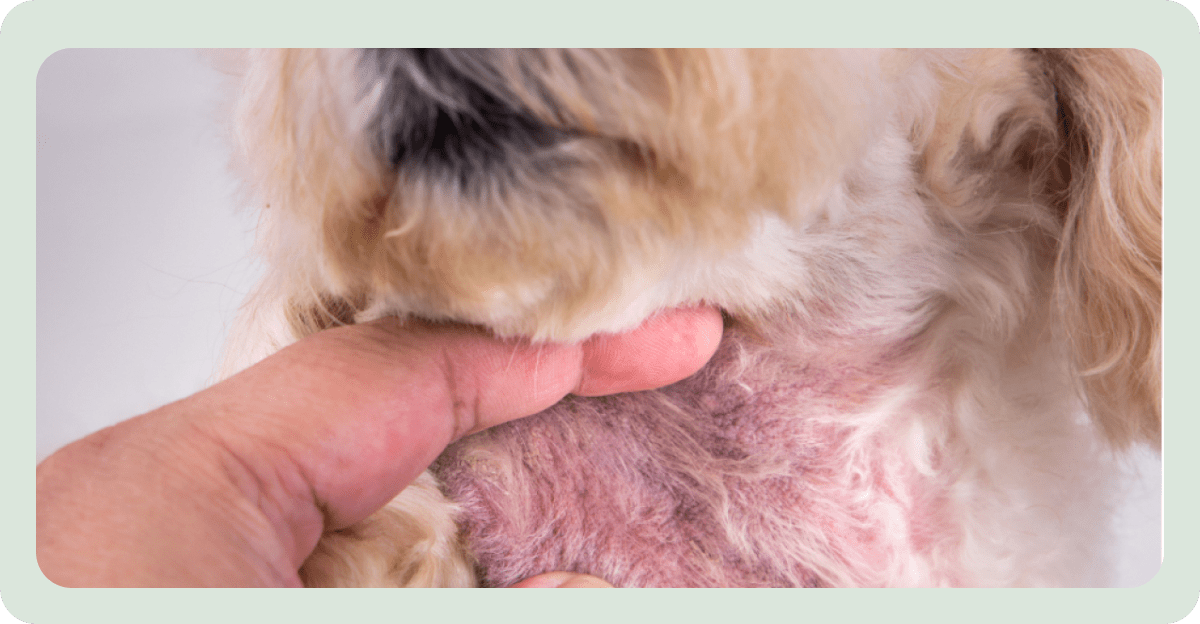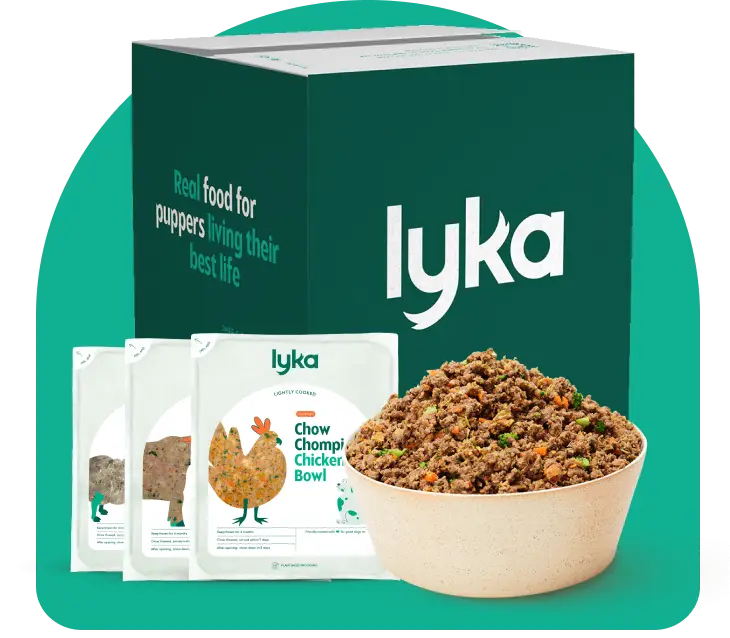Hair loss in dogs: Could it be my dog’s diet?

By Olivia Blazevic

If you’ve got a pup that seems to shed their weight in hair each day, chances are you’ve got a few lint rollers on hand.
Good news — shedding hair is a totally normal biological process for dogs of all breeds, even the ‘hypoallergenic’ non-shedding ones!
However, it can sometimes mean something more serious. If you’ve noticed bald patches or thinning hair, it could be a sign of a skin condition or another underlying health concern. Often, hair loss and skin issues are caused by malnutrition — the result of a diet that lacks the right macro and micronutrients.
In this article, we take a closer look at:
Normal shedding or hair loss — how to tell the difference
Symptoms of hair loss and associated skin problems
8 common causes of hair loss in dogs
The relationship between diet and hair loss
How deficiencies in certain vitamins can cause hair loss (and what ingredients can help)
Coat and skin-boosting ingredients you should be feeding your pup
Fresh food nutrition for healthy skin and coat
Before opting for a comb-over instead of your pup’s usual trim, let’s explore the difference between hair loss and normal shedding.
Normal shedding or hair loss?
Every dog sheds a different amount of hair depending on their breed, the season and their health. Age also affects hair loss with senior pups shedding more than juniors, just like humans!
The trick is to be mindful of what a ‘normal’ shed looks like for your pup so that you’re more likely to notice any changes. There could be more hair on your clothes, furniture and their bedding than usual, or you might see hair loss in localised areas like around their eyes or on the base or tip of their tail.
Localised hair loss such as bald spots (alopecia) is different to shedding because it is not a normal biological process and can be a symptom of an underlying condition or a disease. Your vet will be able to check the area to identify the cause of hair loss and suggest an appropriate treatment.
Symptoms to look out for:
Excessive hair loss
Thinning, brittle hair
Bald patches
Scratching in the same area leading to hair loss
Redness, rashes or hives
Dry scaly skin
Balding on joints from pressure sores or age (usually in senior dogs)

8 common causes of hair loss in dogs
Hair loss in dogs is often a temporary issue that can be resolved with a change in diet or vet-prescribed medication.
Some main causes of hair loss and bald patches in dogs are:
Atopic dermatitis: Environmental allergies invariably lead to pruritus (itchy skin) and bald patches.
Skin infections: Bacterial or fungal infections in the skin (e.g. ringworm) can cause localised alopecia.
Parasites: Itchy flea bites stimulate scratching and gnawing that can cause hair loss. Demodectic Mange is caused by microscopic mites in hair follicles that create bald spots.
Bites or stings: Insect bites or stings can trigger hives that can leave small bald patches.
Food allergies/intolerances: Food sensitivities can cause skin irritations that lead to persistent scratching and subsequent hair loss.
Cushing’s Disease: This disease is caused by the overproduction of the hormone cortisol and often causes alopecia.
Hypothyroidism: An underactive thyroid often triggers dull and thinning hair and bald patches in places of friction.
Post-clipping alopecia: An area of hair that has been clipped short or shaved by the vet which may take time to regrow.

Is my dog’s diet causing their hair loss?
Excessive shedding as well as thin, brittle and patchy hair is often a visible indication of nutritional deficiencies. As the skin is a dog’s first defence against infections, allergies and parasites, a poor coat and hair loss can also suggest a weak immune system.
Your dog’s gut microbiome regulates their immune system, so it needs to be in tip-top condition to keep your dog in excellent health and their coat thick and shiny.
Unfortunately, most commercial pet foods don’t contain all the vital nutrients needed for a complete and balanced diet. These highly processed foods are usually carb-heavy, include low-quality ingredients and are cooked at extreme temperatures that affect the nutritional value, leading to malnutrition and hair loss.
A complete diet containing the right macro and micronutrients, together with gut-boosting pre and probiotics is the natural way to balance your pup’s microbiome and strengthen their immune system.
What skin and coat-boosting ingredients should I feed my dog?
The skin is the largest organ of the body, the first immune defence barrier, and contains hair follicles. A healthy coat also relies on healthy skin, so ingredients that boost both are beneficial to pups.
It can be difficult to know if your dog is getting the right nutrients in the right quantities, especially if you’re buying kibble.
Here’s a rundown of the essential coat and skin-boosting nutrients that support optimal skin and hair health and strengthens your pup’s immune system.
Essential Fatty Acids (EFAs)
Essential fatty acids are vital for your dog’s bodily functions, they support the absorption of vitamins and promote healthy skin and coat.
EFAs like omega-3 and omega-6 cannot be synthesised naturally, so they need to be added to their diet, preferably in wholefood ingredients that are more easily digested and absorbed.
Found in:
Omega 3: Fresh fish, fish oil, hemp seeds, flaxseed oil
Omega 6 (CLA): Grass-fed beef, hemp seeds, safflower oil
Antioxidants
A diet rich in antioxidants limits the damaging effects of oxidative stress caused by free radicals, leading to healthy skin, follicles and hair.
Found in: Blueberries, coconut, green cabbage, kale, mushrooms
Protein
Protein plays many crucial roles in your dog’s body. It’s needed to grow hair and form new skin cells and it boosts the immune system.
However, not all protein sources have the same quality. Grass-fed animals tend to have lower levels of fat overall, but higher levels of EFAs (omega-3 and omega-6). So, the source of the protein is also important to consider as well as the type of protein itself.
Found in: Egg, kangaroo, lamb, turkey, chicken, beef
Vitamins
Like humans, vitamins are essential for growth and development. A lack of important vitamins in the diet can lead to deficiencies.
Vitamin A
Beta Carotene (converts to Vitamin A in your dog’s system) for overall immune health and strong skin and coat.
Found in: Butternut squash, carrots, kale, broccoli
Vitamin B6
Vitamin B6 supports your pup’s nervous system, and hormone regulation and helps to maintain coat condition, and heart health and supports the growth of red blood cells. Together with Vitamin A and Zinc, it creates a powerful combination.
Found in:Chicken, turkey, cauliflower
Vitamin E
This vitamin plays an important role in cell function, supports the immune system, reduces inflammation and is a powerful antioxidant — everything that healthy hair and skin need.
Found in: Spinach, broccoli, butternut squash
Minerals
Minerals are vital for your dog’s bodily functions from cell formation to nerve function to hormone production. It is important to provide the right amount of each mineral in your dog’s diet as an oversupply can be just as damaging as a deficiency.
Zinc
This mineral is essential for healthy skin and coat because of its role in cell growth and replication, and immune function.
Found in: Chia seeds, red and white meat, fish and root vegetables
Copper
Dietary copper is used in skin and hair growth and to help make red blood cells.
Found in: Spirulina, liver, spinach
Selenium
Trace minerals, like selenium, play an important role in bolstering a strong immune system and in your dog’s thyroid function.
Found in: Shiitake mushrooms
Phytonutrients
Phytonutrients are natural chemicals produced by plants. One of their main benefits is their antioxidant properties which have shown promise as a photoprotectant (reduction of ultraviolet (UV) radiation-induced skin damage and skin cancers). As the skin is where hair follicles develop and hair grows, a healthy barrier is important.
Found in: Broccoli, carrots, tomatoes
The fresh food solution for a thick and shiny coat
At Lyka, each of our fresh, wholefood meals have been specifically designed by our in-house Veterinarian, Dr. Matthew Muir, alongside a team of board-certified vet nutritionists. Each dish is a perfectly balanced and complete meal with exactly the right combination of macro and micronutrients to support excellent health and wellbeing.
If your dog's hair loss and skin vitality are a concern, our Fish and Beef recipes are bursting with essential fatty acids, high-quality protein, vitamins, minerals and powerful antioxidants for a thick and shiny coat, healthy skin and a strong immune system.
For targeted and preventive care, our Skin Pupper Supps are a powerful bite-sized nutritional supplement to give your pup’s skin and hair an extra boost. Like our meals, they are research-based and made from 100% human-grade wholefood ingredients.
The Lyka story
Our company started when our founder, Anna Podolsky, noticed that her Border Collie cross, Lyka, began to experience health issues including bald patches and severely itchy ears and mouth.
Anna’s own positive experience eating a healthy diet made her wonder if the same would work for Lyka. Her research into commercial dog food was eye-opening. So, she decided to prepare fresh, homemade meals for her pupper instead.
The transformation was remarkable. Lyka was more energetic, her skin was no longer itchy and her coat became thick and glossy. Lyka the dog was back to full health in no time, and Lyka the brand was born.
Want to know how Lyka has helped other dogs grow thick and shiny coats? Read Masie’s story.
This article was reviewed by Lyka’s animal care experts.
Reviewed by:
Dr. Darcy Marshall BSc (Hons), Doctor of Veterinary Medicine
Louise Hawkins, Qualified Veterinary Nurse and Research and Development Associate





